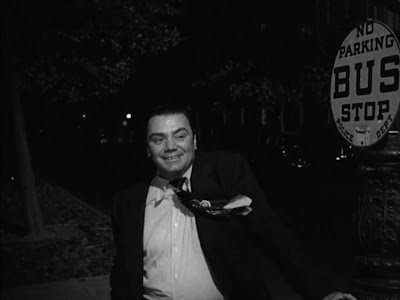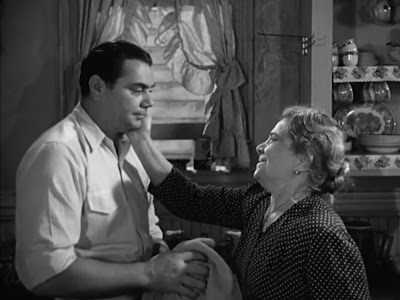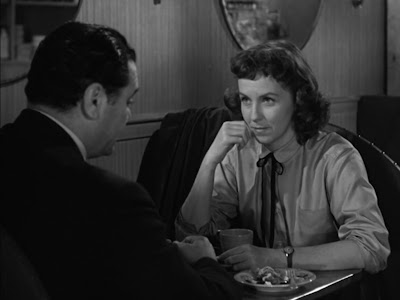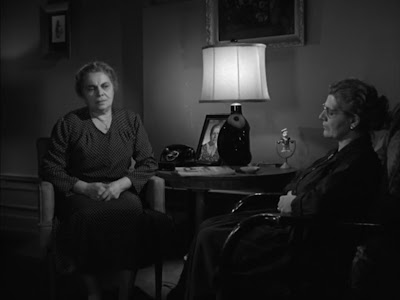 |
| Marty (Ernest Borgnine) finally has a very good night. |
Release Date: Apr. 11, 1955. Running Time: 93 minutes. Screenplay: Paddy Chayefsky. Producer: Harold Hecht. Director: Delbert Mann.
THE PLOT:
Marty Piletti (Ernest Borgnine) is a Bronx butcher who shares a house with his mother (Esther Minciotti). He is 34 and single - and with his siblings all married, he feels increasing pressure to find a nice girl. But heavyset, socially awkward Marty just doesn't do well in that area. "Whatever it is that women like, I ain't got it!" he complains.
Reluctantly, he allows his friend Angie (Joe Mantell) to take him to a dance hall. Sure enough, Angie quickly finds a girl to dance with, while Marty is blown off. He settles in for yet another evening of quiet social torture, and the worst part is that he's gotten used to it.
Then he meets a fellow social outcast: Clara (Betsy Blair), a 29 year old teacher whose formal manner and plain appearance have left her as rejected by men as Marty has been by women. Marty finds her crying after her date has abandoned her. He comforts her out of decency. Then they get to talking, and they quickly discover just how much they have in common. Soon, the chance encounter turns into a full-blown date.
There's only one problem: Marty's friends and family, the same ones who have pushed him to find someone, are less than enthusiastic when faced with the reality that he may not be single much longer...
 |
| Marty with his mother (Esther Minciotti). |
ERNEST BORGNINE AS MARTY:
Ernest Borgnine's Oscar-winning performance is layered and subtle. He retains a mask of even-tempered, almost neutral politeness that's as much for his own protection as anything. An early scene sees him calling a young woman to ask for a date. Later, he approaches a woman to ask for a dance. In both cases, the way he holds himself and the tentative tone in his voice shows that he's expecting rejection even before he begins speaking - as if internalizing it will somehow keep it from hurting.
Borgnine's performance is very physical. There are scenes near the start and end, almost bookends, of him sitting alone after arguing with his mother. His posture in the chair makes him look smaller, emphasizing his acute loneliness. Borgnine doesn't do anything to draw attention to it. He just hunches a little bit forward, adopting a blank look that emphasizes Marty's hopelessness more than any actual expression could manage. When he finally moves, it's slowly, as if drawing himself up just to walk takes effort.
Then he meets Clara. Suddenly, conversation flows free, like a river of talk that has been building for years, waiting to burst through the dam he's built over it. His posture becomes truly relaxed for the first time in the film. When he drops her off for the night, his enthusiasm is such that he can't stop himself from running, grinning, into the night. It's only when he encounters resistance from his mother and from Angie that the mask goes back up, his eyes dulling, his movements slowing, and his voice returning to its prior neutrality.
For Borgnine, Marty was a game-changer. He could have easily spent his career playing heavies such as the memorably sadistic sergeant in From Here to Eternity. Marty showed his range, allowing him to be charming and pathetic, enthusiastic and hopeless, romantic and painfully shy, all within a single role that he embodies with absolute authenticity.
 |
| Marty and Clara (Betsy Blair) spend hours just talking. |
OTHER CHARACTERS:
Clara: As Clara, whom several characters refer to as a "dog," the filmmakers cast Betsy Blair... proving that Hollywood's tendency to cast genuinely attractive women in so-called plain roles is anything but new. In some ways, Clara is Marty's opposite. She is well-educated, and her family appears to enjoy a higher overall social status. Even so, she is presented in a way that parallels her with Marty, even before they meet. We see Marty being rejected by women, then we see Clara's date brushing her off in favor of someone younger, prettier, and more outgoing. Marty is shown standing alone at the edge of the dance floor, in much the way Clara sits alone at a table. By the time they finally share the screen, the viewer is already primed to root for them as a couple.
Mrs. Piletti: Marty's mother (Esther Minciotti), who shares her house with Marty. She worries about him still being single when all of his siblings have married, and she pushes him to go out even when he would rather stay home. But she also relies on Marty for companionship and to maintain the house. When he brings Clara home, Mrs. Piletti instantly worries that her son will abandon her - a worry not helped by her overbearing sister (Augusta Ciolli), who is essentially being evicted by her own son and his wife.
Angie: Marty's best friend (Joe Mantell) is about the same age, and he is also under pressure to find a wife. He and Marty seem to spend each Saturday night just hanging out. Angie complains about Marty's preference for staying in and watching television; as the slimmer friend who easily finds a dance partner, he can't fully comprehend why his heavyset friend is reluctant to go out looking for rejection. Like Marty's mother, he seems to rely on Marty's companionship, and he reacts badly when his friend finally finds a woman he really likes.
 |
| Mrs. Piletti visits her sister (Augusta Ciolli), who makes her worry about being abandoned. |
THE SCRIPT: STRUCTURE AND REPETITION:
I can't help but find it interesting that the harshest words Marty hears against Clara come from Angie and his mother. During the night of the date, Marty runs into three people he knows: Angie, his mother, and another acquaintance named Ralph (Frank Sutton). The final Act, which occurs the next day, sees Marty encountering the same three. Angie and Mrs. Piletti are both harsh in assessing Clara, but Ralph doesn't even mention her.
Ralph is important here because of the difference we observe. Mrs. Piletti and Angie have become dependent on Marty's availability. Mrs. Piletti spends Saturday night with her sister, observing her sadness at being asked to leave the home she shares with her son and his wife. After Marty leaves with Clara, Angie spends the rest of Saturday night wandering aimlessly, clearly not knowing what to do with himself. By the time they meet Clara, they view her as a threat and do all they can to convince him not to see her again. By contrast, Ralph is just a casual acquaintance. To him, Clara's irrelevant, save to ask Marty how he "made out."
The script is by Paddy Chayevsky, so it's little surprise that it's well-written. Though the movie is basically a succession of scenes of people talking either to or around each other, we get a sense of their larger worlds. Marty has an opportunity to buy the butcher's shop where he works. It's obvious that he wants to buy it, but he feels nervousness: at the financial commitment, at the potential competition from supermarkets, and (unspoken) at the responsibility. Clara has her own opportunity for advancement, with the prospect of a job where she could become department head, but the job would mean moving away from her parents. Meanwhile, Marty's current life is an endless repetition of the same evening.
Chayevsky was always great with dialogue, and the characters' speech has an almost musical rhythm. Marty and Angie sit around a diner, reading the paper while mechanically intoning: "What do you feel like doing tonight?" "I don't know, Ange, what do you feel like doing?" After being asked to leave her son's house so that he and his wife can have space to be a couple, Mrs. Piletti's sister laments: "These are the worst years, I tell you." Then she repeats the statement, adding to her sister: "It's gonna happen to you." Then, after another refrain, she repeats, "These are terrible years... terrible years... It's gonna happen to you." Near the end, Marty's mother evasively condemns Clara: "Is she Italian girl? ...She don't look Italian to me. What family she comes from? ...She don't look Italian."
The empty repetitions cease in two circumstances. The first is when Marty lets his mask drop out of frustration, expressing to his mother the pain of constant rejection. The naked emotion is raw and direct, without the circular evasiveness that characterizes most of the movie's speech. The other is when he's talking with Clara. Their conversations are direct and eloquent as they disclose their backgrounds, hopes, and fears. This is yet another way the film emphasizes their connection.
 |
| "What do you feel like doing tonight?" Marty engages in a familiar ritual with his best friend, Angie (Joe Mantell). |
OTHER MUSINGS:
Marty was a low-budget film, made for a mere $350,000. Little was expected of it. Production company Hecht-Lancaster reportedly considered releasing it as a "B" picture, at the bottom of a double bill, and had to be persuaded otherwise. With no major stars, the official trailer actually saw Burt Lancaster introducing the movie to audiences to grant star power by association.
Then it got released, and the reviews that came in weren't just positive - Critics gushed over it. Marty quickly became a hit. At a time when big budget, big studio films dominated, its success helped to prove the viability of low-budget independent films. It also boosted the profile of Hecht-Lancaster as a production company, with its post-Marty titles including such releases as Separate Tables, The Sweet Smell of Success, Run Silent, Run Deep, and The Birdman of Alcatraz.
A side note: Actress Betsy Blair was actually blacklisted, with Marty being her first role since 1951. But she also was married to Gene Kelly, whose star was at its height. When Kelly threatened to pull out of It's Always Fair Weather, Blair was cast despite the blacklist. Yes, it happened because she was married to a superstar - but I'm not sure Gene Kelly would have swayed the studio had it been, say, 1952, when the Red Scare was at its height. Also, Blair's blacklisted status did not stop her from earning acclaim for the role or from being nominated as Best Supporting Actress. I'll go into this topic more when I reach The Bridge on the River Kwai... but Betsy Blair's casting in Marty may represent the first visible sign that the blacklist would not be sustainable.
 |
| Marty (Rod Steiger) dances with Clara (Nancy Marchand) in the 1953 television version. |
1953 TELEVISION VERSION:
I've regularly discussed "Remakes and Retellings" of Best Picture Winners. Well, in this case, Marty the movie was the remake. Paddy Chayevsky adapted his own teleplay for a 1953 presentation of The Philco Television Playhouse. The earlier version, starring Rod Steiger and Nancy Marchand, still exists and is still available, and it is well worth seeing in its own right.
It's interesting to watch the two versions side-by-side. Much of the dialogue is identical, but they are very different products. Rod Steiger leans hard into Marty as an introvert. Steiger emphasizes the character's pain; in the movie, Ernest Borgnine plays the emotional pain convincingly, but what he really pushes is Marty's innate decency. Both actors are great, but I prefer Borgnine. There's a real joy in his connection with Clara that I don't quite feel in Steiger's version. It helps that movie Clara is a considerably stronger character than the television version, thanks in large part to some well-advised script expansions Chayevsky made to get the runtime to 90 minutes.
OVERALL:
Marty is the shortest Best Picture winner ever released... even if you count Sunrise: A Song of Two Humans in the mix. Its story is simple, and it consists almost entirely of conversations between people. However, the people are authentic and likable; their conversations are funny, interesting, and emotional; and the story is at all times entirely relatable. It's a very small-scale work, but its small-scale world is so detailed and textured that the viewer is made to feel connected in a way that larger films rarely accomplish.
Some of the mannerisms and speech patterns have dated. Still, the emotional core is as relatable as ever, and the movie remains a joy to watch.
Overall Rating: 10/10. Yes, again. What can I say? In the early-to-mid '50s, the Academy had a brief run of actually getting it right.
Related Post: Cracks in the Wall - Marty, The Bridge on the River Kwai, and the Decline of the Hollywood Blacklist
Best Motion Picture - 1954: On the Waterfront
Best Motion Picture - 1956: Around the World in 80 Days
Review Index
To receive new review updates, follow me:
On BlueSky:
On Threads:


No comments:
Post a Comment